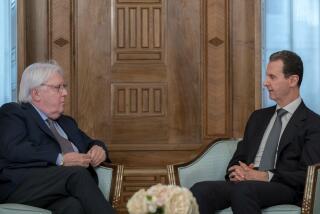Arab League Again Pleads Case to Iraq : Diplomacy: Weakened body hardens its position against Baghdad. But only 13 of 21 members attended.
- Share via
CAIRO — A weakened and divided Arab League on Saturday renewed its call for Iraq to end a monthlong occupation of Kuwait and appealed to Iraqi President Saddam Hussein to release thousands of foreign hostages.
The league hardened its position against Baghdad, demanding that Iraq pay reparations to the Kuwaiti government for damages and losses caused by the Aug. 2 invasion.
But only 13 of the 21 members of the Arab League were represented at the two-day meeting, which was boycotted by pro-Baghdad governments. Libya, a friend of Iraq, attended but dissented on several resolutions.
The foreign ministers present gave their backing to U.N. Secretary General Javier Perez de Cuellar, who was meeting in Jordan with Iraqi Foreign Minister Tarik Aziz to seek a peaceful solution to the Persian Gulf crisis.
They asserted, however, that all peace initiatives should be submitted to the Arab League, which is “the proper and sound” forum for proposals made on behalf of Arab countries--an intrepid claim given the divided state of Arab League affairs.
Egyptian Foreign Minister Esmat Abdel Meguid told a press conference: “We are insisting that any peace solution meet two prerequisites: the total and unconditional withdrawal of Iraq and the return to the status quo, the legitimacy of Kuwait. If one of these conditions is not fulfilled, then we cannot accept it.”
He added, “It is for Iraq to take the lead and not for others to make concessions against acts of aggression.”
Also Saturday, Libyan leader Moammar Kadafi outlined a peace plan calling for the replacement of Iraqi troops in Kuwait with U.N forces, and of U.S. troops in Saudi Arabia with Arab and Islamic forces.
Kadafi specifically endorsed Iraq’s claims to two Kuwaiti islands and the Rumaila oil field on their disputed border, and linked an Iraqi withdrawal from Kuwait with a pullout of Western forces from the region.
The proposal, outlined at an extraordinary session of Libya’s General People’s Congress, was similar to other Arab initiatives that have been rejected by the United States, which demands that Iraq leave Kuwait immediately and without conditions.
At an Arab summit in Cairo on Aug. 10, a dozen Arab leaders adopted a resolution condemning the invasion, calling for Iraq’s unconditional withdrawal and agreeing to send an all-Arab military force to Saudi Arabia. Iraq’s allies dissented in that vote.
Of Arab League nations, only Egypt, Syria and Morocco have sent troops to join U.S. and other Western forces in the gulf. The Arabs seem increasingly nervous that they will be drawn into war, allied with the United States against fellow Arabs in Iraq.
Meguid defended the presence of Western forces, saying, “There is an inherent right for any country to ask for assistance and support in case of a threat.” He added that the foreign forces would have to leave if Iraq withdraws from Kuwait.
According to its charter, the league is supposed to make decisions unanimously. The invasion has underscored the fact that the Arab world is divided into two camps, a conservative-leaning group that is now represented by Saudi Arabia and Egypt and a more radical group considered pro-Iraqi.
Iraq and its allies--Algeria, Tunisia, Sudan, Yemen, Mauritania, Jordan and the Palestine Liberation Organization--did not attend the meeting.
Some political observers believe the gulf crisis will bring the demise of the 45-year-old Arab League. Meguid tried to downplay the impact of the divisions.
“I don’t think we are seeing the end of the Arab League. There is certainly division within the Arab League. Opinions are divided, but a majority has voted for the resolution. This majority thinks we have right on our side,” Meguid said.
“The others are not for the annexation of Kuwait. If they are working on solutions it is not to consecrate the end of Kuwait. . . . The difficulties between us may be a question of the way of handling the crisis,” he said.
More to Read
Sign up for Essential California
The most important California stories and recommendations in your inbox every morning.
You may occasionally receive promotional content from the Los Angeles Times.













